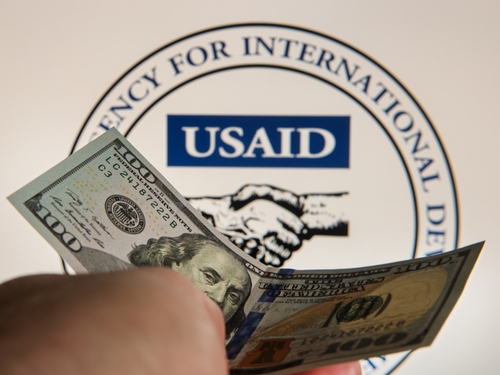U.S. Supreme Court
Averting immediate showdown, chief justice pauses judge’s deadline for US to restore foreign-aid funds

The U.S. government doesn’t have to comply with a federal judge’s Wednesday night deadline to restore foreign-aid funds after Chief Justice John Roberts issued an administrative stay in the matter. (Photo from Shutterstock)
The U.S. government doesn’t have to comply with a federal judge’s Wednesday night deadline to restore foreign-aid funds after Chief Justice John Roberts issued an administrative stay in the matter.
Roberts issued the temporary stay late Wednesday in two consolidated lawsuits challenging a 90-day freeze in funding for foreign assistance programs. A plaintiff in one of the suits is the ABA, which had “tens of millions of dollars” in federal funding frozen for foreign rule of law and human rights programs, its suit said.
The Washington Post, Reuters, NBC News, Law.com, SCOTUSblog and the New York Times are among the publications with coverage.
Plaintiffs in the suit consolidated with the ABA’s alleged Feb. 19 that government defendants showed “brazen defiance” of a Feb. 13 temporary restraining order requiring restoration of funding.
U.S. District Judge Amir H. Ali of the District of Columbia issued the Feb. 13 TRO. On Feb. 25, Ali issued a bench ruling setting the deadline at 11:59 p.m. Feb. 26 for compliance with his order requiring payment on completed contracts. The U.S. government immediately appealed.
Amir’s order appears to contemplate the immediate outlay of nearly $2 billion, according to the stay request filed with the Supreme Court by Acting U.S. Solicitor General Sarah Harris.
The government is committed to paying legitimate claims for work, and it is “undertaking significant efforts” toward that end, Harris said.
“What the government cannot do,” Harris wrote, “is pay arbitrarily determined demands on an arbitrary timeline of the district court’s choosing or according to extra-contractual rules that the court has devised. That mandate creates an untenable payment plan at odds with the president’s obligations under Article II to protect the integrity of the federal fisc and make appropriate judgments about foreign aid.”
The stay request argued that the suits amount to claims for breach of contract that should be heard by the U.S. Court of Federal Claims.
The cases are U.S. Department of State v. AIDS Vaccine Advocacy Coalition and Trump v. Global Health Council.
Write a letter to the editor, share a story tip or update, or report an error.

